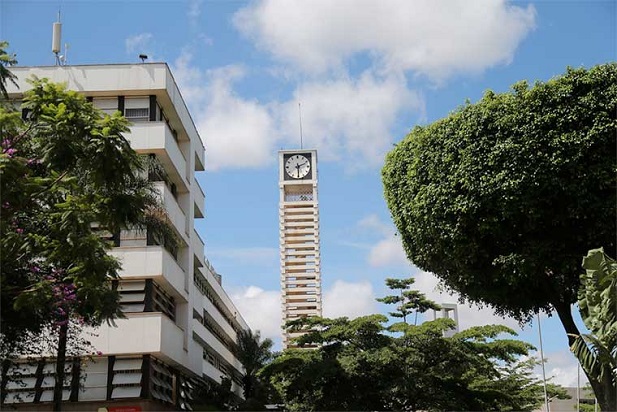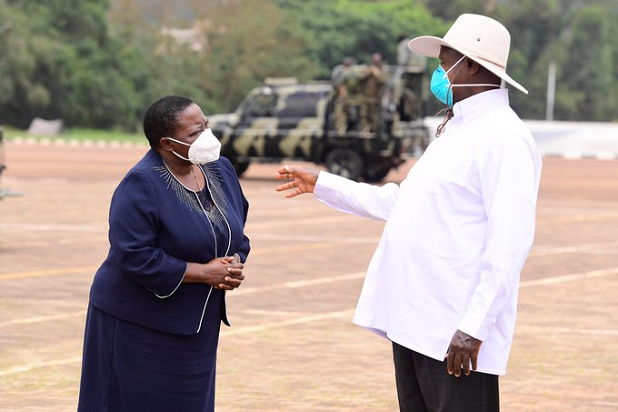KCCA headquarters in Kampala aka City Hall
Harriet Kizza, 56 has been working with Kampala Capital City Authority-KCCA since 2011, desilting drainage channels in different parts of the City.
She wakes up as early as 5am to prepare for work and by the latest 6am, she’s at her station of work to begin the day.
Her supervisors draft a plan for desilting the channels so she knows where to go every morning.
Ideally, Kizza needs heavy waterproof gloves, liquid-repellent overalls and rubber gumboots as her protective gear to don before descending into the drainage channels to desilt them.
However, Kizza, who wore a track trouser inside torn overalls says they lack the required protective gear to protect them as they execute their duties.
Their gunboats are torn and they lack gloves that would have protected their hands as they touch the filth.
Kizza says their supervisors are aware of the situation but are equally constrained so much that they deploy them without the required protective gear.
They descend into stinking deep drainage channels with storm waters, garbage, fecal matter, dead animals and sharp materials to clean them.
Kizza says the lack of Protective Gear has exposed them to illnesses they do not know. She narrates how in 2017, she thought she would lose her life after falling sick and doctors told her that she had infections that had spread throughout her body causing itching and excruciating pain.
She says the situation is not unique to her as several of her colleagues have been diagnosed with several infections.
Another laborer who only identified himself as Atuhairwe tells quite a similar story, braving to clean dirty drainage channels with bare hands. He says protective gear given by KCCA is worn-out and the authority is yet to retool them.
Atuhairwe also says the effects of doing his job without protective gear have not spared him. A family man with two wives, Atuhairwe says in recent years, he has developed erectile dysfunction, and attributes this to the manner in which he carries about his duties.
Abdullah Ali Halage, a Public Health Expert from Makerere University Kampala says that all workers cleaning the city should be given personal protective gear which include gloves, overalls, gumboots and goggles, among others.
Halage, who has conducted research into waste disposal in Kampala says that many homes and businesses do not segregate their waste and therefore, a reasonable amount of harmful material like needles and broken glasses end up in domestic waste. Halage says that the presence of harmful material in waste makes it risky for people who collect that garbage from communities and those who desilt drainage channels since some of the garbage ends up in the drainages.
Although the National Environment Management Authority -NEMA, National Environment (Waste Management) regulations 2020 require people who generate hazardous domestic waste to segregate it from non-hazardous waste to avoid harming human health or the environment. Halage says many households in Kampala are yet to embrace the culture of sorting waste.
Kampala produces over 2,000 tons of garbage daily but only about 56 percent is collected, with private companies collecting 32 percent and KCCA 24 percent. Some of the uncollected waste ends up in communities including drainage channels.
Halage says that casual workers are exposed to injuries like cuts and pricks from sharp materials, something that could cause wounds and probably other infections leading to diseases like tetanus. He adds that working in filthy places without protection could also expose them to waterborne diseases.
Halage also wants casual workers to be provided with wash facilities to use and a convenient place to change clothes from at the end of their day.
In a recent interview with our reporter, the manager of Waste and Sanitation at KCCA Jude Byansi revealed that the Authority is constrained by funding but added that they are working on getting more gear for the workers. He however says that some of the protective gear should be bought by the workers themselves since they are employed through SACCOs, contracted to clean the city.
-URN





